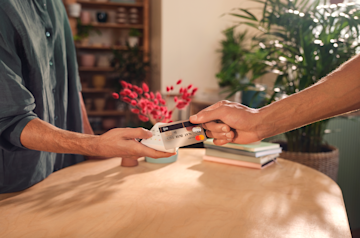
Setting up a website—the tools you need to succeed in 2021
Having an online presence has become an essential way to build your image and reach new customers. Read on to learn how to set up a website that suits your needs and your budget.
7 min read
Are you self-employed and seeking to improve your business’ visibility? Then you may be looking to set up a website. Having an online presence has become an essential way to build your image and reach new customers. Read on to learn how to set up a website that suits your needs and your budget.
When you work for yourself, it’s not always easy to gain the trust of potential clients and grow your client base. That’s why it’s a good idea to set up a website when starting out. By creating a virtual storefront, your business becomes accessible and discoverable to a broader population. You can use your website to communicate business updates, connect with current customers and potential customers, introduce your products and services, and even make sales directly online.And unlike social media profiles, a website is a platform that belongs to you. That means there’s no risk of your page being deleted or closed down. Don't know where to begin? Read on for the essential steps to get started.These days setting up a website is easier than ever, but there’s still some steps everyone needs to follow to successfully launch a site.The domain name is your website’s URL address. You can use your brand name, your first name and surname, or keywords that represent your business. Our advice—keep it as simple as possible. Your domain name should be easy to remember and pronounce.Next, you need to check if your domain name is available. You can do this by searching the OVH website or other hosting providers.Finally, you need to choose your extension. Your domain name extension is the suffix at the end—like .com, .fr, or .org. To make your domain easier to remember and search for, we recommend using a well-known extension like .com or .fr.Found your perfect domain name? Great! Now it’s time to get down to business and buy it. Many people buy their domain names through a web host. A web host is a company with servers that store website content. Some well-known web hosting companies are OVH, Ionos, and O2Switch. You can also buy the hosting for your site, which is essential for your website to be viewable online, at the same time. Another option is to purchase your domain name and web hosting through an integrated web builder, like Wix or Squarespace, where you can also design your site. Read on for more details about these multi-use platforms.Once you've purchased the domain name and hosting capabilities, you’ll need a platform to build your site. If you don’t know how to code, we recommend using a content management system (CMS) that lets you design a site without having to use html code.Which CMS platforms do we recommend? Keep reading to find out!There are many online tools you can use to make your website, but here are a few CMS you can use to easily build a website without coding:Web building platforms allow you to do it all—buy your domain name, design your website, and host it—in one spot. A well known built-in web builder is Wix. This integrated platform allows you to create your website in just a few hours simply by dragging and dropping your text and images into one of their more than 500 templates. Another option is Squarespace. This platform has fewer designs, but they’re particularly attractive and minimalist.Who are these platforms for? Wix and Squarespace are great for self-employed people who want to create a website with just a few pages. However, their ease of use does have a downside—it’s not as easy to customise and include specialty features because everything is pre-designed. If you want to develop your business using an online marketing strategy, we recommend a third option which is fully customisable and free—WordPress.Wordpress is probably the best known web CMS on the internet—in fact, they claim 42% of the web uses their platform. The company uses open source software, which allows you to design your website for free. To get started, all you have to do is sign up at wordpress.org.With WordPress, you can design your website using free or paid templates, purchased through a platform like Themeforest, or use a page builder, like Divi or Elementor, to design your pages.One of WordPress’ greatest capabilities is allowing users to add website plugins—and there are more than 50,000 of them! A WordPress plugin is a module that allows you to add many features to your site without having to code—including anti-spam software, specific fonts, resized images, and more. Another strength is its organic SEO, or search engine optimization, which is an asset for anyone looking to develop a long-term online strategy.The downside of WordPress is that, although it’s easy to use, it’s not as intuitive and takes more time to learn than Wix and Squarespace. That’s why we recommend WordPress for those who want a fully personalized site, or who need to create a lot of pages, like a blog. As you can see, WordPress is ideal for creating more advanced websites. Whether you want to create multilingual sites, forums, e-shops, or blogs—the sky’s the limit with this CMS!Are you looking to specifically create an e-commerce site? If so, there are specialized platforms that can help. In WordPress, the WooCommerce plugin allows you to create a commercial website for free and tailor it to your business. Another option is the French open source platform PrestaShop, which is a bit like WordPress for online stores. Don't have time to learn how to use WordPress or PrestaShop? In that case, try Shopify! While you need to pay for it, you can quickly launch your store since it’s so easy to use. Both Wix and Squarespace also offer the option to create an online store.If you’re interested in setting up shop on the web, check out our article on how to open your online store easily.The cost of setting up a website depends on several factors, including the number of web pages, the standard of design, and the CMS you require.If you create your own site, whether you choose WordPress, Wix, Squarespace or any other CMS, you should at least add up the annual cost of the domain name and hosting. According to La Fabrique du Net, the cost of a site can vary from fifty euros to several hundred euros per year, depending on your choice.If you don't have the time or skills to create your website, you can also consider hiring an agency or freelance web designer. Expect to pay anywhere from €500 to €3,000 for a storefront site created by a freelancer, and €1,500 to €8,000 for a site created by a professional agency.Now that you know how to create your own website and build your business online, you may also be interested in reading up on how to manage your budget as a freelancer.To make life easier when you’re freelancing, N26 is here to support your financial needs. With our N26 Business accounts, you can manage your professional transactions in real-time through our mobile app. We also provide free payments in all currencies, between 0.1% and 0.5% cashback on your card purchases, and detailed monthly statistics on your spending. Our N26 Business You and N26 Business Metal premium professional accounts even include lifestyle and travel insurance to give you extra peace of mind.
Why should you create a website when you’re self-employed?
How to create your website in 3 steps
1) Find a domain name
2) Buy your domain name and web host
3) Choose the right CMS platform
What tools should you choose to create a website?
Integrated platforms
Creating a website with Wordpress
Software for creating a commercial website
How much does it cost to create a website?
N26 Business—bank accounts for freelancers
Find similar stories
BY N26Love your bank
Related Post
These might also interest youLIFESTYLECould AI help you manage your money?86% of people are open to using AI for financial planning, but is it safe? Learn how AI is already transforming money management, and discover the pros and cons.
4 min read
LIFESTYLEUnderstanding tariffsFrom higher grocery bills, pricier electronics, and stock market swings, tariffs can impact your wallet and your investments.
5 min read
LIFESTYLEDe-hyping the no-spend challengeThis extreme challenge promises to transform your finances, but is it really the game-changer it claims to be?
4 min read


